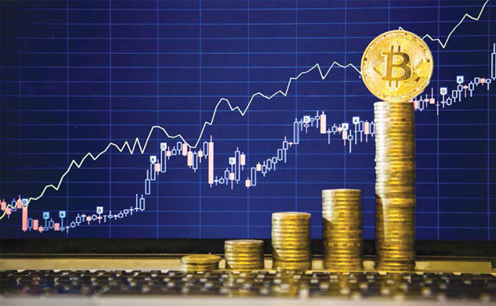Bitcoin is getting to be the Big Coin. Its value is skyrocketing, and many are buying into it. The Bitcoin is virtually spinning out into a parallel money market. But what is Bitcoin, what is the attraction, and what are the dangers? Here is a glimpse into the phenomenon of the Bitcoin
Unlike the regular tax desk which is manned by a tax officer whose job is to levy tax on you, this desk is manned by a non-serving tax officer who wishes to share his experience of 35 years in the tax department, while, discussing tax provisions. It is advantageous to know how the tax department thinks and acts when, as said by Benjamin Franklin, “In this world nothing is certain except death and taxes”

These days ‘Bitcoin’ is the talk of the monetary market. People are betting on its value which has skyrocketed in recent months. Bitcoin is turning into a Big Coin. However, there is also a section of experts who consider it a bubble which can burst any time. The value of one Bitcoin has gone up to US $14,000 which approximates to ` 9 lakh. This means that for 10 Bitcoins one can purchase a luxurious Mercedes Benz car or BMW car. Just about eight years back when the value of the Bitcoin was being tested for the first time, it was found that 10,000 Bitcoins could purchase one pizza. The sharp rise in the value of the Bitcoin in such a short time is mind-boggling and beyond reasonable comprehension. It is being heard that world over people are mortgaging their properties to have a taste of the Bitcoin pie while blaming their luck for having missed the early ride in the Bitcoin cart.
What is Bitcoin? It is a cryptocurrency with a worldwide payment system. It is the first decentralised digital currency, as the system works without a central bank or a single administrator. The network is peer-to-peer and transactions take place between users directly through the use of cryptography without any intermediary. These transactions are verified by network nodes and recorded in an immutable public-distributed ledger, called a blockchain. The Bitcoin was invented by an unknown person or group of people under the name of Satoshi Nakamoto and the same was released as open-source software in 2009. The process of creating Bitcoins is called mining. They can be exchanged for other currencies, products and services. In 2010, Nakamoto handed the network alert key and control of the Bitcoin core repository over to Gavin Anderson, who later became the lead developer at the Bitcoin Foundation. Nakamoto subsequently disappeared from any involvement in Bitcoin. Decentralisation of the system was done by Anderson.

Bitcoin is pseudonymous, meaning that funds are not tied to real-world entities but rather to Bitcoin addresses. Owners of Bitcoin addresses are not explicitly identified, but all transactions in the blockchain are public. In addition, transactions can be linked to individuals and companies through ‘Idioms of Use’. Bitcoin exchanges where Bitcoins are traded for traditional currencies may be required by law to collect personal information. The system permits having a new Bitcoin address for each transaction and this ensures financial privacy.
Unlike paper currencies, Bitcoins cannot be minted. They can only be mined. There are only 21 billion Bitcoins that have been created. At present only 16.8 million or 80% of all the Bitcoins have been mined. Bitcoins can be bought from various digital currency exchanges such as Uncoin, Zebpay, coinbase.com, coindesk.com, etc. These can be purchased by the use of credit cards or debit cards. Bitcoin is a digital asset without any earmarked value attached to it as is the case of normal currencies world over where the central bank of the country attaches a fixed value to each currency. The value of Bitcoin is determined by the demand and supply in normal trade. The owner of Bitcoin cannot go to any central authority in case of any loss or any attached problem as it is not regulated by any authority.
Is Bitcoin legal? There is no clarity on this issue. The Government of India or the RBI has not pronounced any strict law banning it as illegal. No such law has been made in other countries either. However, the RBI has cautioned people investing in Bitcoin. Similar caution has been articulated by SEBI also. A PIL has been filed before the Supreme Court and the apex court has asked for the response from the government. Similar warnings of caution have also been issued in other countries as well. Despite RBI’s caution, Bitcoin exchange Zebpay is adding 2,500 users a day. Recently, US SEC has issued a strict warning to Bitcoin investors to be cautious, but despite all these warnings, the Bitcoin market cap has gone up to US $200 billion. According to Bit infor, a website tracking Bitcoin price and ownership data, there are 10 ‘Digital Wallets’ holding more than $1-billion-worth Bitcoins. However, it has not revealed where in the world these wallets are located or whether they are owned by syndicates, organisations or individuals.
As per Indian Income Tax provision, income earned against Bitcoin will be taxable as capital gains or business income, depending on the facts of the case. If the investment in Bitcoin is done in the capacity of investors, the income earned on it will be taxed as capital gains, while if the investment is done as an organised and periodic activity, then it will be taxed as business income. For capital gains purposes if the investment is for less than three years, then the same will be taxable as short-term capital gains and the tax liability will be higher as compared to tax liability in the case of long-term capital gains, when the investment is for three years and above. Like in normal cases, the non-disclosure of assessable income will attract tax on the concealed income along with penalty and in extreme cases, even prosecution. The Income Tax department has recently conducted survey action against Bitcoin exchanges to study the modus operandi of Bitcoin investment and also to identify tax evaders out of identified Bitcoin investors.
‘Is Bitcoin legal? There is no clarity on this issue. The Government of India or the RBI has not pronounced any strict law banning it as illegal. No such law has been made in other countries either’
Why is Bitcoin becoming a Big Coin in value despite all the warnings of caution? The short answer can be, because of people’s increasing love for it. The increasing love is based on some intrinsic advantages:
Then why are warnings of caution raised against Bitcoin? The reasons are:
There is an urgent need in our country and also the world over to take the issue of Bitcoin more seriously. There may be a way for e-ponzi schemes to be devised by scamsters in the lack of virtual money. There is an urgent need for enacting laws and regulation. There is some confusion as to whether to ban it altogether, or to permit it with rules and regulations. There is one school of thought that says that Bitcoin helps the policy of the government for less physical cash in the economy while the other school is dead against it as it is seen as used by people with black money, and that it is also used in criminal activities. Last but not the least, gullible investors will be the worst victims when the bubble of the Bitcoin bursts.
by S K Jha